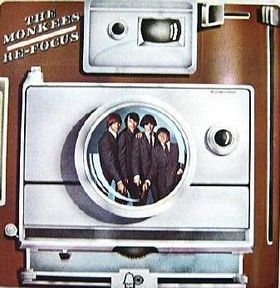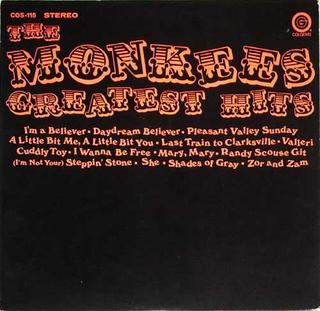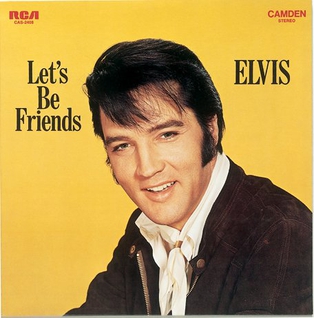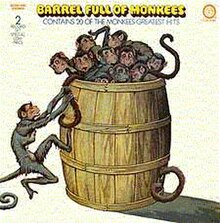
Robert Michael Nesmith was an American musician, songwriter, and actor. He was best known as a member of the Monkees and co-star of their TV series of the same (1966–1968). His songwriting credits with the Monkees include "Mary, Mary", "The Girl I Knew Somewhere", "Tapioca Tundra", "Circle Sky" and "Listen to the Band". Additionally, his song "Different Drum" became a hit for Linda Ronstadt and the Stone Poneys.

The Monkees were an American pop rock band formed in Los Angeles in the mid-1960s. The band consisted of Micky Dolenz, Davy Jones, Michael Nesmith, and Peter Tork. Spurred by the success of the television show of the same name, The Monkees were one of the most successful bands of the late 1960s. With international hits, four chart-topping albums and three chart-topping songs, they sold more than 75 million records worldwide.

An extended play (EP) is a musical recording that contains more tracks than a single but fewer than an album or LP record. Contemporary EPs generally contain four to six tracks and have a playing time of 15 to 22 minutes. There is no strict definition of an "EP", but it is usually less cohesive than an album and more "non-committal".

Pisces, Aquarius, Capricorn & Jones Ltd. is the fourth album by the Monkees. It was released on November 6, 1967, during a period when the band exerted more control over their music and performed many of the instruments themselves. However, although the group had complete artistic control over the procceedings, they invited more outside contributions than on their previous album, Headquarters, and used session musicians to complement their sound. The album also featured one of the first uses of the Moog synthesizer in popular music. Pisces, Aquarius, Capricorn & Jones Ltd. sold over three million copies. It was the band's fourth consecutive album to reach No. 1 on the U.S. Billboard 200.

Headquarters is the third studio album by the Monkees, released in May 1967 after the first season of their television series had concluded. It was the first album on which the group members made substantial songwriting and instrumental contributions, rather than relying on session musicians and professional songwriters. After a struggle for creative autonomy with their record label, the group had been allowed, to a degree, to record by themselves. Headquarters became the group's third consecutive No. 1 album on the Billboard 200 chart and was certified double platinum in the United States with sales of more than two million copies within the first two months of release. It also peaked at No. 2 on the UK charts. It is included in the 2006 book 1001 Albums You Must Hear Before You Die.

The Monkees is the debut studio album by the American band the Monkees. It was released on October 10, 1966 by Colgems Records in the United States and RCA Victor in the rest of the world. It was the first of four consecutive U.S. number one albums for the group, taking the top spot on the Billboard 200 for 13 weeks, after which it was displaced by the band's second album. It also topped the UK charts in 1967. The Monkees has been certified quintuple platinum by the RIAA, with sales of over five million copies.

Changes is the ninth studio album by the Monkees. The album was issued after Michael Nesmith's exit from the band, leaving only Micky Dolenz and Davy Jones to fulfill the recording contract they had signed in the mid-1960s. Changes was their last new album for Colgems Records and the group's last album of all new material until Pool It!, released in 1987.

"I Wanna Be Free" is a song written by Tommy Boyce and Bobby Hart that was first performed by The Monkees and appeared on their debut album The Monkees in 1966. It was released as a single in some countries, reaching the Top 20 in Australia. It was also covered by The Lettermen.

Colgems Records was a record label that existed from 1966 to 1971.
Colpix Records was the first recording company for Columbia Pictures–Screen Gems. Colpix got its name from combining Columbia (Col) and Pictures (Pix). CBS, which owned Columbia Records, then sued Columbia Pictures for trademark infringement over the Colpix name.

The Monkees Greatest Hits is a 1976 greatest hits compilation album of songs by the Monkees released by Arista Records and a reissue of an earlier Bell Records compilation, Re-Focus.

Re-Focus is a 1972 compilation album of songs by the Monkees, released on Bell Records, the successor to Colgems Records, the Monkees' original record label.

Then & Now... the Best of The Monkees is a compilation album of songs by the 1960s American pop group the Monkees, released by Arista Records in 1986.

The Monkees Greatest Hits is the first greatest hits compilation album by the American pop rock band the Monkees, released in 1969 by Colgems Records.
Bell Records was an American record label founded in 1952 in New York City by Arthur Shimkin, the owner of the children's record label Golden Records, and initially a unit of Pocket Books, after the rights to the name were acquired from Benny Bell who used the Bell name to issue risque novelty records. A British branch was also active in the 1960s and 1970s. Bell Records was shut down in late 1974, and its assets were transferred to Columbia Pictures' new label, Arista Records.

Missing Links Volume Three is a compilation album of rare and previously unreleased songs by The Monkees issued by Rhino Records in 1996. It is the third and final volume of a three-volume set, preceded by Missing Links in 1987 and Missing Links Volume Two in 1990.

Let's Be Friends is a compilation album by American singer and musician Elvis Presley, released by RCA Records CAS 2408, in April 1970. It is the second Presley budget album to appear on the low-priced RCA Camden label. It peaked at number 105 on the Billboard 200 album chart. It was certified Gold on June 15, 1999 and Platinum on January 6, 2004 by the Recording Industry Association of America.

The Monkees' discography spans over 50 years, from the release of their first single, "Last Train to Clarksville" in August 1966 to their final live album The Mike and Micky Show in April 2020. Their discography is complicated due to the large volume of unique releases in many international markets, the release of many recordings not credited to the Monkees for lack of rights to the trademark, and the existence of many bootleg, promotional, and novelty recordings that are beyond the scope of this article.

"A Little Bit Me, a Little Bit You" is a song written by Neil Diamond, recorded by the Monkees in 1967 and released as a single on the Colgems label. The lead vocal was Davy Jones' first on a Monkees single. The single reached No. 1 on the Cashbox Top 100 chart, while on the Billboard Hot 100 it reached No. 2, with "Somethin' Stupid" by Frank Sinatra and Nancy Sinatra keeping it from the top spot.

"Listen to the Band" is a song by American pop rock band the Monkees, released on Colgems single 5004 on April 26, 1969. Written by Michael Nesmith, it is the first time Nesmith sang lead vocals on a Monkees single A-side.

















